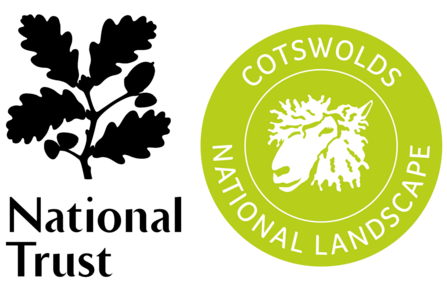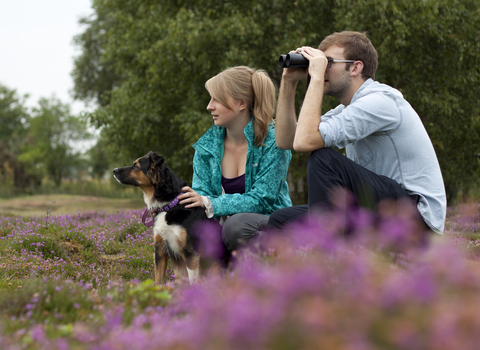Dogs are one of our best-loved companions and going on walks in nature with our four-legged friends is a pleasure that millions of us enjoy each year.
They enrich our lives in many ways, encouraging us to get outside and connecting us to nature, but looking after and training them is a huge responsibility.
Just over a quarter of households in the UK are now dog owners, and with over 10 million dogs roaming the country it’s more important than ever to be as conscientious and considerate as we can.
Responsible owners and their dogs are welcome on almost all of GWT nature reserves, though there are some areas where dogs must remain on leads or cannot go due to the delicate nature of these wildlife havens.
Discover how to strike a balance between getting out and about with your dog and giving wildlife and wild places space to thrive by watching the film below, produced in partnership with Cotswolds National Landscape and The National Trust.
Our top tips for how you can take the lead and help us care for wildlife
Play your part and pick up after your dog
Dog poo can introduce extra nutrients and unwanted chemicals from medication into the soil, making it harder for wildflowers to flourish by encouraging nettles and thistles.
It can also pose a threat to grazing livestock – dog poo contains bacteria that can cause disease in people and animals, as well as spoiling others’ enjoyment of these wild places.
Always pick up after your dog, even if there are no dog bins provided. Where there are no dog bins provided, please pick up and take it home with you.
Be aware of where your dog should be on a lead
Keep your dog on a lead unless otherwise advised and note where we request you to not take your four-legged companion.
Some nature reserves aren’t suitable for dogs due to the delicate nature of the habitat – this could be due to ground-nesting birds, rare plants or insects, grazing animals or other reasons.
Do respect other visitors
Other people may not be as comfortable around canines, and dogs of any size can cause serious fright and anxiety.
Dogs can knock people over when they get excited, which can be especially dangerous or frightening to those who are elderly or to small children.
Give livestock a 10m distance at all times
The conservation grazing herds are busy doing vital work - maintaining grasslands, opening up glades and pushing wildflower seeds into the ground being just a few of their responsibilities.
Please keep at least a 10m distance from them at all times.
Ensure total recall
When letting your dog off the lead in safe areas, be certain they will come back when called and that they don’t roam too far – sticking to the paths as much as possible means wildlife isn’t disturbed and you can keep a closer eye on them.
Follow requests from nature reserve staff
The land management team want your visit to these wild places to be as safe and get as much enjoyment from your visit as possible, while making sure that wildlife is given the space it needs. Please follow their instructions and guidance at all times.
Water safety
Some dogs love the water, and we'd love to find a balance between them having fun and caring for nature. If your dog is a swimmer, please read the information below.
Dogs running in and out of ponds can erode the banks, damaging plant life and releasing sediment into the water. This sediment can cloud the water, blocking out light for the plants and animals living below.
To help with this, take them to designated dog ponds or dog dip sections of rivers.
Flea treatments that are added to the back of dog’s necks contain pesticides that can kill freshwater invertebrates. This treatment is very soluble, washing off easily when your dog goes for a swim and potentially harming invertebrates like beetles, dragonfly larvae and mayflies.
You can avoid this by not letting your dog go swimming for a few days after you have applied flea treatment.
If in doubt, check the Nature Reserve Guide
Our latest book has a helpful code to show where dogs are welcome, on a lead, or not allowed. This information can also be found on the nature reserve webpages.
You can also pick up a copy from our cafés at Robinswood Hill and Crickley Hill.
Did you know that while flea treatments are effective at keeping dogs safe, they can wash off when they go for a swim, harming aquatic wildlife


